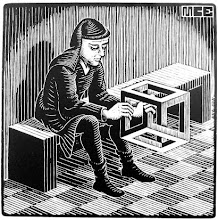From a recent talk on ABC Radio NationalA recent international urban design conference on the Gold Coast highlighted three major areas of change that our cities and towns are facing.
Firstly, the climate change as a phenomenon is already abundantly clear, whether induced by human actions or is part of a natural cycle.
Secondly, the sources and security of energy which is absolutely vital to the way people live are certainly likely to change. The changes will be triggered either by our endeavours to manage the drivers of climate change, our CO2 emissions; the depletion of supply of liquid hydrocarbon fuels and their consequent higher prices or both.
Thirdly, an increasing number of the Australian population will be the older generation. We are likely to be living longer and there is already a clear trend that our households are predominantly of ones and two's rather than families of three's or more (while ironically occupying more domestic space per person). All this awaits us in the next 10 to 20 years - a very short time in the life of cities.
Cities have had to deal with changing conditions in the past. However, few changes in history have approached them at the rate they are advancing upon us now. Yet, we have chosen to ignore these realities like symptoms of a nasty disease. We have entered a state of denial. We are making furtive and superficial provisions for the changing future such as minor gestures towards public transport, planting some trees to offset carbon emissions and optionally installing a few water tanks. However, this is largely equivalent to taking the foot off the accelerator while our brakeless car hurtles towards the cliff.
Let us be optimistic that the future will offer some redeeming options. But should even an optimist not have a PLAN B? At the moment we are relying on faith alone that somehow everything will turn out right. However, retrofitting cities and towns is usually an immensely expensive and often impossible business. To say that we will fix it when the day comes is an option we will all regret. We need to revise our thinking about cities and towns NOW!
As we face the challenging future, the most fundamental of mindset shifts is to realise that cities and towns are not merely a stock of real estate, built property as a type of asset or capital, all held together with engineering infrastructure and transport arteries. It is all those things but primarily it is the stage setting of life for most of us. It is the background 'scenery' and props against and around which we participate in social and cultural interactions, live out our mortal existence, seek happiness and fulfilment.
We often complain about inconveniences, lack of amenities and opportunities or blame the authorities for creating places and conditions that we would rather not have. The only way we will be able to collectively respond to climate change, energy issues or our new social structures is to realise that WE ourselves are largely the problem as well as the major part of the solution.
As a new measure of urban quality and planning objective, I suggest that every part of a city or town be evaluated thus: if your car fell out of action for a week or more or you were unable to drive for an extended period, could you meet most of the essentials of your daily, weekly or seasonal needs by walking, cycling or using public transport (which includes taxis)? This is not to imply that we should forgo all means of private transport. However, this test would transform the paradigm of scale and thinking about cities and towns.
Our most eminent social researcher Hugh Mackay, writing in 'Advance Australia Where?' says "If we ultimately had to choose between material prosperity and survival, which way do you think we would jump? If we know the answer, why not act now, so we never have to face that choice." That is exactly the type of choice that confronts our towns and cities right now. Unless we adopt a different mind set about them, we will not only be creating an uncomfortable future for ourselves but leaving a difficult legacy for our children and grandchildren. Is that really what we want?
If we are to effectively deal with climate change, energy security and cost as well as demographic adjustments, we need to rethink the way we make, use and live in cities and towns - and we need to do it NOW.
by Jursi Greste
Urban designer with an architectural background and over 50 years of professional experience as a consultant.

 For some time residents in Notting Hill have been concerned about the activities of real estate agents and false advertising.
For some time residents in Notting Hill have been concerned about the activities of real estate agents and false advertising.


